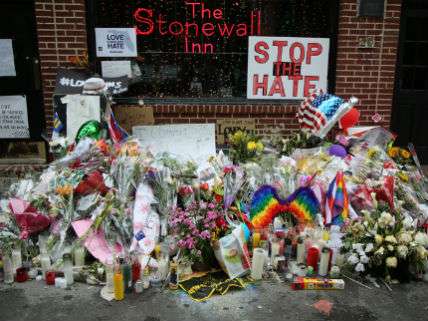How America's Counter-Terrorism Model Is Making American Less Safe and Free
The Orlando massacre shows the folly of fighting a decentralized terrorism model with centralization.

Our sage leaders on both sides of the aisle believe that to preempt the next Orlando, we need to hand intelligence agencies more unconstitutional surveillance powers. Sen. John Cornyn (R-Texas) is already pushing to grant the FBI's long-standing wish to obtain the web browsing history and other electronic records in terrorism investigations without a court order. Meanwhile, presumptive Democratic presidential nominee Hillary Clinton wants to give the FBI more draconian powers to put people on government terror watch lists.
But the lesson from the Orlando massacre isn't just that our intelligence systems failed. It's that they cannot succeed.
We need a paradigm shift. Rather than keeping alive the false hope that centralized intelligence bureaucracies can effectively stop lone-wolf terrorists, we need to encourage private entities like clubs, malls, movie theaters, and other places where people gather to take charge of their own security — just like they do in other countries, like India.
Surveillance-based counter terrorism worked, at least in theory, when state actors whose designs could be ascertained by a network of informants and spies dominated the terrorism business. Even al Qaeda's cell model, where the mother organization in a distant land coordinated the actions of a group on foreign ground, could be targeted by intelligence agencies since terrorist members also needed to communicate among themselves. But lone-wolf terrorism in the vein of Orlando and San Bernardino has evolved to dodge precisely such surveillance.
Otherwise, Mateen wouldn't have succeeded. It's not like the FBI didn't investigate him. But the feds had to let him go because there was nothing incriminating in his past beyond some stray statements. It wasn't until his attack that he pledged allegiance to ISIS, but the FBI would have needed omniscience to see that coming.
It is likely that Mateen, who was clearly disturbed, suddenly decided to hitch his angst to a readily available ideology to give meaning to his feelings. We can debate ad nauseam whether it was his Muslim background or his closeted homosexuality that caused him to go radical, but from the standpoint of effective counterterrorism, that debate is worse than useless; it's a distraction. The sources of terrorism do and will vary. Remember that the bloodiest carnage by a homegrown terrorist in America was committed by a crazy white dude in Oklahoma 20 years ago. Also recall that the worst mass shooting in the world was perpetrated by another white lone-wolf terrorist, Andres Breivik, in Norway four years ago, when he gunned down 69 young people at a summer camp (and bombed another eight).
Breivik wrote the ultimate 1,518-page guide that helped transform the cell-based terror model to the atomized individual or lone-wolf model of terrorism. In his grisly study, Breivik cautioned future terrorists that they would increase their chance of being apprehended by 100 percent for every person they involve. "Don't trust anyone unless you absolutely need to (which should never be the case)," he wrote. "Do everything by yourself."
We live in an era of easy radicalization where Breivik's guide can aid any single would-be terrorist. Is it all that inconceivable that a neo-reactionary white guy who has had enough with the humiliation and emasculation from feministas could decide to bomb a meeting of Social Justice Warriors? Or a Black Lives Matter activist who thinks that white privilege has become so oppressive that the whole system needs to be blown up, piece by piece? How about an eco-warrior who believes that he'll be doing humanity a favor by taking out folks or factories with large carbon footprints?
Fixating on the motives of such extremists and trying to understand their ideology won't serve the cause of good policy. What we need is a counterterrorism strategy that works regardless of motives. That means building numerous, individual points of resistance.
To that end, liberal suggestions to ban assault weapons and impose other gun restrictions are truly benighted — not to mention atavistic. They also run counter to the strategy that Israel, the country with long and bitter experience dealing with the kind of terrorism that is only now fully maturing in America, has opted for.
Israel requires all its active duty soldiers — men and women — to carry their weapons and ammunition at all times, even when out on personal business. The idea is that terrorists can strike anywhere, anytime, and government cannot (and should not) be omnipresent, protecting every individual at every time. What is true for a tiny country like Israel is doubly true for an enormous one like America. To be sure, Israel has stringent civilian gun ownership regulations, but the relevant point is that the government doesn't zealously guard its monopoly on providing security.
Things are very similar in India. Movie theaters have private security resembling what you'd find at the airport. After the 2011 Mumbai attack, private establishments beefed up security even more, and often have armed guards at the entrances. It is now impossible to get into a mall without going through a metal detector or drive into a hotel without opening the trunk for examination. Neighborhoods have become gated communities. One can debate if all of this is effective and some of it is definitely overkill. But the fact is that people are making their own risk assessment and acting accordingly rather than relying on a distant government.
Something similar will need to happen in America if the terrorist threat keeps growing. It will be a huge mental adjustment, a shock to the system. We will be less carefree. But it's better than being less free.
This piece originally appeared in The Week


Show Comments (163)